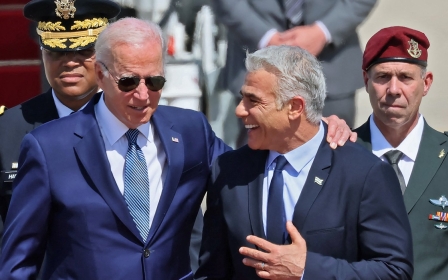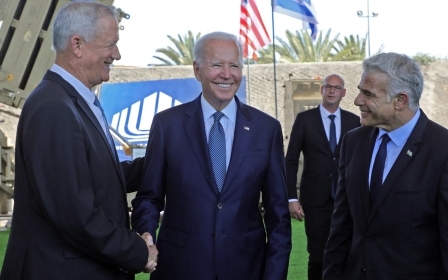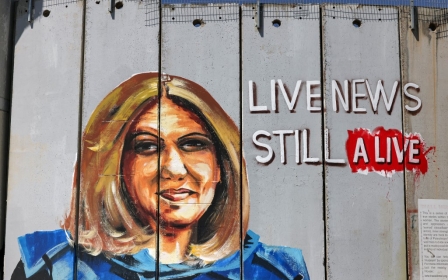US, Israel sign joint declaration, vow to counter nuclear Iran
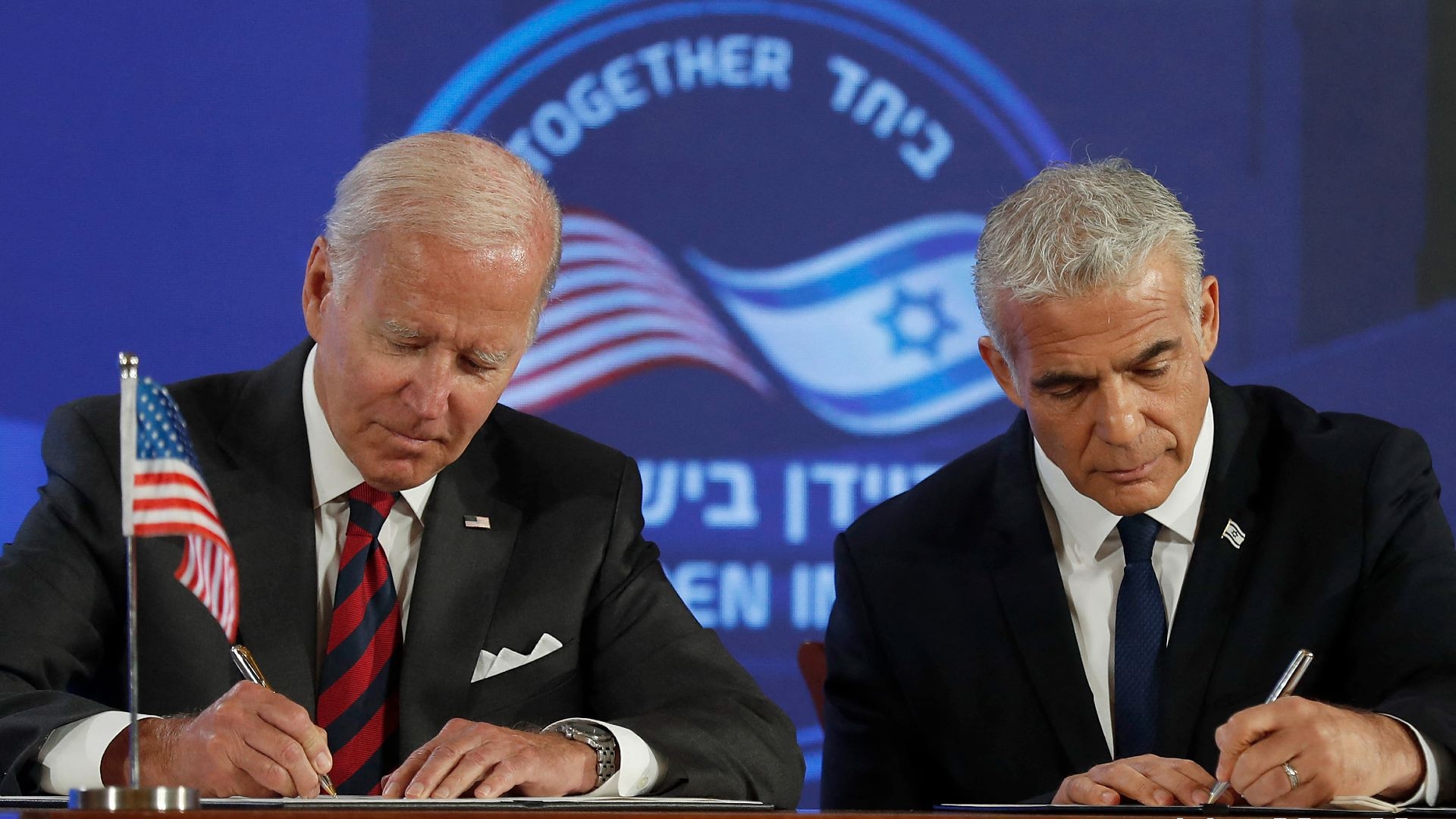
US President Joe Biden and Israel's caretaker Prime Minister Yair Lapid on Thursday signed a bilateral strategic partnership agreement, in which Washington said it would utilise "all elements in its national power" to prevent Iran from obtaining a nuclear weapon.
The agreement, signed by the two leaders during Biden's visit to Israel, outlines a number of issues of bilateral partnership, from furthering Israeli normalisation with Arab countries to securing a visa waiver programme for Israelis entering the US.
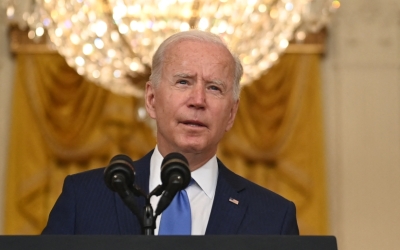
New MEE newsletter: Jerusalem Dispatch
Sign up to get the latest insights and analysis on Israel-Palestine, alongside Turkey Unpacked and other MEE newsletters
At the forefront of the agreement was a US commitment to counter Iran's nuclear programme, a concern highlighted over the past year by Israel and a number of Arab Gulf countries including Saudi Arabia and the United Arab Emirates. Iran denies seeking nuclear weapons and has stated its nuclear pursuits are solely for its energy needs.
"The United States stresses that integral to this pledge is the commitment never to allow Iran to acquire a nuclear weapon, and that it is prepared to use all elements of its national power to ensure that outcome," the statement read.
The declaration comes amid stalled nuclear talks with Iran, in which the Biden administration and the administration of Iranian President Ibrahim Raisi have been for months trying to secure an agreement to return to the 2015 accord, which former US President Donald Trump unilaterally left in 2018.
"I continue to believe that diplomacy is the best way to achieve this outcome," Biden said during a news conference with Lapid in Jerusalem, but added that, "we'll continue to work with Israel to counter other threats from Iran throughout the region".
It also included a pledge by the US to continue playing an active role in further advancing the Trump-brokered normalisation agreements between Israel and four Arab countries: the UAE, Bahrain, Morocco, and Sudan.
The statement noted that this issue will be a part of Biden's visit to Saudi Arabia later this week, although the US president has also stated that full normalisation between Riyadh and Israel is a far step away from now.
"When I see the Saudi leadership tomorrow, I'll be carrying a direct message, a message of peace and extraordinary opportunities that a more stable integrated region could bring to the region and, quite frankly, the whole world," Biden said during the news conference.
Joint call against BDS movement
In Thursday's declaration, the US and Israel also agreed to combat the Palestinian-led Boycott, Divestment, and Sanctions (BDS) movement, a campaign that has been elevated to the national stage in American politics.
"The United States and Israel affirm that they will continue to work together to combat all efforts to boycott or de-legitimize Israel, to deny its right to self-defense, or to unfairly single it out in any forum, including at the United Nations or the International Criminal Court," the statement said.
"While fully respecting the right to freedom of expression, they firmly reject the BDS campaign."
In recent years, the BDS movement has been brought to national attention, with more than 30 US states passing legislation that requires state contractors to sign a pledge not to boycott Israel. The legislations have been met with lawsuits in a number of these states, in which rights organisations argue the laws violate US free speech laws.
The issue of boycotting Israel also came into the fray last year when Vermont-based ice cream maker Ben & Jerry's announced it would no longer sell its products in Israeli settlements in the occupied West Bank. While Ben & Jerry's stressed it would continue to operate in Israel, the news was met by Israeli leaders and US states with condemnation alike, accusing the company of boycotting Israel.
Thursday's declaration reaffirmed support for the two-state solution for Israelis and Palestinians, but the Biden administration has been criticised by Palestinian advocates for not giving attention to the plight of Palestinians.
The visit by Biden has been seen by many Palestinians as an extension of Washington's decades-long allegiance to Israel at the expense of Palestinian rights and freedom.
The statement on Thursday also says that the United States and Israel "condemn the deplorable series of terrorist attacks against Israeli citizens in recent months and affirm the need to confront radical forces, such as Hamas", but makes no mention of Israeli abuses against Palestinians.
Biden will visit the Israeli-occupied Palestinian territories on Friday, where he will meet with the Palestinian Authority President Mahmoud Abbas and other Palestinian leaders. However, it is unclear if the killing of Palestinian journalist Shireen Abu Akleh will be brought up during their meeting.
Abu Akleh, a veteran journalist for Al Jazeera Arabic and a US citizen, was shot and killed by Israeli forces in May while covering an Israeli raid on the Palestinian village of Jenin. The US concluded earlier this month that Abu Akleh was killed by "accident", in a statement that outraged Palestinians.
Dimitri Diliani, a senior member of Abbas’s Fatah party who supports an anti-Abbas faction, told the Washington Post that Abbas is not expected to bring up Abu Akleh's killing.
"The US, and so the PA, have decided to sell the blood of Shireen and American citizens to support the Israeli coverup," Diliani said.
The US did not accept Abu Akleh's family's invitation to meet during his visit, but instead, the State Department invited the family to meet in Washington.
Middle East Eye delivers independent and unrivalled coverage and analysis of the Middle East, North Africa and beyond. To learn more about republishing this content and the associated fees, please fill out this form. More about MEE can be found here.



